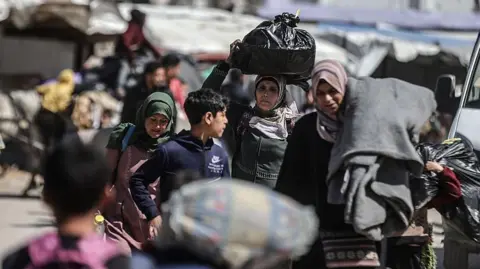The ongoing conflict in Gaza has reached unprecedented heights, exacerbating an urgent humanitarian crisis that has left countless lives shattered. Mirjana Spoljaric, the head of the International Committee of the Red Cross (ICRC), recently shared her harrowing assessment of the situation, describing Gaza as “hell on earth” amidst a continuing Israeli military assault. Her remarks come during a critical juncture as the violence persists, leading to an alarming number of casualties and displacements.
Israeli actions have seen significant casualties, with reports indicating that as many as 1,542 individuals have lost their lives since the fighting escalated on March 18, 2025. The situation has resulted in an almost incomprehensible displacement of nearly 400,000 people as they flee from the relentless bombardments. The Israel Defense Forces (IDF) have imposed evacuation orders and a strict blockade since early March, restricting the flow of essential supplies such as food, water, and medical resources into Gaza. These measures have raised critical concerns regarding adherence to international humanitarian laws.
The Red Cross, which ensures compliance with the Geneva Conventions, is cautious in its interventions. Traditionally, it engages confidentially with conflicting parties, only publicly denouncing violations when conditions mandate it. However, Spoljaric’s bold declaration reflects a growing sense of urgency about the fraying humanitarian standards in Gaza, citing the situation as an “extreme hollowing out” of international law.
Israel, on its part, maintains that it adheres strictly to international law, arguing that the unique challenges of the conflict—such as the concealment of Hamas operatives among civilians—occasionally result in collateral damage. Israeli officials assert that they possess sufficient food supplies for the residents of Gaza and emphasize that military actions are aimed at compelling Hamas to release hostages taken during the October 7, 2023, attack, when hundreds lost their lives and significant numbers were abducted.
Under the Fourth Geneva Convention, there exists an obligation for occupying powers to ensure the welfare of civilians, which includes providing food and medical care and refraining from the forced transfer of populations. Spoljaric emphasized that no entity is exempt from accountability for war crimes, stating unequivocally that “these rules apply universally” regardless of circumstances.
The plight of civilians has been profound, with many experiencing multi-fold displacements and witnessing their homes reduced to rubble. Alarming statistics indicate that women and children constitute the entirety of casualties from 36 verified airstrikes recently analyzed by the United Nations Human Rights Office. Israeli military responses, including airstrikes in Khan Younis targeting alleged militant sites, have drawn serious scrutiny amid accusations of disregard for civilian lives.
A consistent theme echoed in multiple UN assessments reflects concerns over the “cumulative impact” of Israel’s military actions, suggesting that the local Palestinian population faces conditions incompatible with their survival as a group. In stark criticism, UN Secretary-General calls to attention the blockade’s violation of Geneva Conventions, labeling Gaza as a “killing field.”
The Geneva Conventions were established post-World War II to protect civilians during conflicts. They outline fundamental principles such as the necessity for medical staff and hospitals to be shielded and the humane treatment of all individuals during warfare. Despite various calls for a renewed ceasefire, optimism remains guarded, given the entrenched nature of the conflict and the alarming mundane reality of dehumanization experienced by many.
The longstanding conflict traces back to Israel’s military actions which, initiated in response to an unprecedented cross-border attack, have led to an appalling number of fatalities—over 50,912—recognized by Gaza’s health authorities. The voices of concern from agencies like the ICRC highlight the critical need for maintaining adherence to the principles established by the Geneva Conventions, arguing that a departure from these tenets not only risks present humanity but also sows discord for future peace.
Spoljaric poignantly noted that the scars from Gaza will endure, haunting current and future generations due to the profound suffering instilled. The situation remains fragile, and the international community faces pressing challenges in navigating a path towards a resolution that both safeguards humanitarian rights and ultimately serves the long-term peace for all involved.











